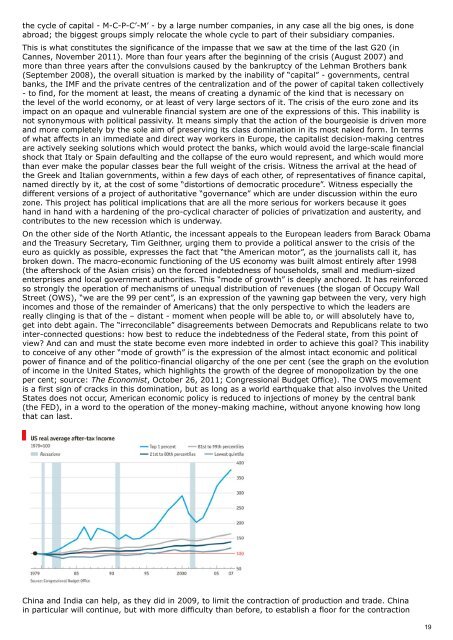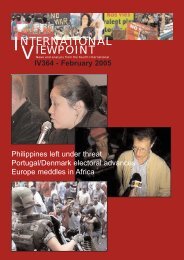download - International Viewpoint
download - International Viewpoint
download - International Viewpoint
Create successful ePaper yourself
Turn your PDF publications into a flip-book with our unique Google optimized e-Paper software.
the cycle of capital - M-C-P-C’-M’ - by a large number companies, in any case all the big ones, is done<br />
abroad; the biggest groups simply relocate the whole cycle to part of their subsidiary companies.<br />
This is what constitutes the significance of the impasse that we saw at the time of the last G20 (in<br />
Cannes, November 2011). More than four years after the beginning of the crisis (August 2007) and<br />
more than three years after the convulsions caused by the bankruptcy of the Lehman Brothers bank<br />
(September 2008), the overall situation is marked by the inability of “capital” - governments, central<br />
banks, the IMF and the private centres of the centralization and of the power of capital taken collectively<br />
- to find, for the moment at least, the means of creating a dynamic of the kind that is necessary on<br />
the level of the world economy, or at least of very large sectors of it. The crisis of the euro zone and its<br />
impact on an opaque and vulnerable financial system are one of the expressions of this. This inability is<br />
not synonymous with political passivity. It means simply that the action of the bourgeoisie is driven more<br />
and more completely by the sole aim of preserving its class domination in its most naked form. In terms<br />
of what affects in an immediate and direct way workers in Europe, the capitalist decision-making centres<br />
are actively seeking solutions which would protect the banks, which would avoid the large-scale financial<br />
shock that Italy or Spain defaulting and the collapse of the euro would represent, and which would more<br />
than ever make the popular classes bear the full weight of the crisis. Witness the arrival at the head of<br />
the Greek and Italian governments, within a few days of each other, of representatives of finance capital,<br />
named directly by it, at the cost of some “distortions of democratic procedure”. Witness especially the<br />
different versions of a project of authoritative “governance” which are under discussion within the euro<br />
zone. This project has political implications that are all the more serious for workers because it goes<br />
hand in hand with a hardening of the pro-cyclical character of policies of privatization and austerity, and<br />
contributes to the new recession which is underway.<br />
On the other side of the North Atlantic, the incessant appeals to the European leaders from Barack Obama<br />
and the Treasury Secretary, Tim Geithner, urging them to provide a political answer to the crisis of the<br />
euro as quickly as possible, expresses the fact that “the American motor”, as the journalists call it, has<br />
broken down. The macro-economic functioning of the US economy was built almost entirely after 1998<br />
(the aftershock of the Asian crisis) on the forced indebtedness of households, small and medium-sized<br />
enterprises and local government authorities. This “mode of growth” is deeply anchored. It has reinforced<br />
so strongly the operation of mechanisms of unequal distribution of revenues (the slogan of Occupy Wall<br />
Street (OWS), “we are the 99 per cent”, is an expression of the yawning gap between the very, very high<br />
incomes and those of the remainder of Americans) that the only perspective to which the leaders are<br />
really clinging is that of the – distant - moment when people will be able to, or will absolutely have to,<br />
get into debt again. The “irreconcilable” disagreements between Democrats and Republicans relate to two<br />
inter-connected questions: how best to reduce the indebtedness of the Federal state, from this point of<br />
view? And can and must the state become even more indebted in order to achieve this goal? This inability<br />
to conceive of any other “mode of growth” is the expression of the almost intact economic and political<br />
power of finance and of the politico-financial oligarchy of the one per cent (see the graph on the evolution<br />
of income in the United States, which highlights the growth of the degree of monopolization by the one<br />
per cent; source: The Economist, October 26, 2011; Congressional Budget Office). The OWS movement<br />
is a first sign of cracks in this domination, but as long as a world earthquake that also involves the United<br />
States does not occur, American economic policy is reduced to injections of money by the central bank<br />
(the FED), in a word to the operation of the money-making machine, without anyone knowing how long<br />
that can last.<br />
China and India can help, as they did in 2009, to limit the contraction of production and trade. China<br />
in particular will continue, but with more difficulty than before, to establish a floor for the contraction<br />
19









